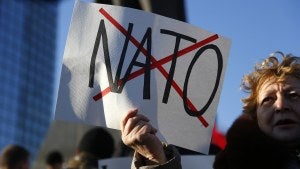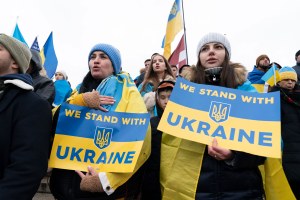Six in 10 continue to support providing economic aid and sending additional arms and military supplies to the Ukrainian government, down slightly from a year ago.
Continued economic support and military assistance to Ukraine was one of the most contentious issues during the budget showdown on Capitol Hill last week. Congress avoided a government shutdown by passing a temporary spending bill that will fund the government through mid-November but the omission of aid to Ukraine was notable. This happened, in part, because there is a growing rift within the Republican party on the United States’ continued support for Ukraine and a vow taken by many Republicans to oppose any stopgap measures or bills that allocate additional funding for Kyiv.
A September 7-18 survey by the Chicago Council on Global Affairs shows that majorities of Americans support continued US economic assistance and military transfers to Ukraine, but those majorities have narrowed since last November. A slim majority also say the $43 billion in military aid already sent to Ukraine has been worth the cost. While many Republicans believe that the United States should urge Kyiv to negotiate with Russia to end the war, half of them still support continuing US financial and military assistance.
Key Findings
- Majorities of Americans continue to support providing economic assistance (61%) and sending additional arms and military supplies to the Ukrainian government (63%), down slightly from a year ago. About half of Republicans agree.
- A narrow majority of Americans say that the $43 billion in weapons, equipment and training that the United States has provided to Ukraine has been worth the cost (53% vs. 45% not worth the cost). Six in 10 Republicans say it has not been worth it.
- As in November 2022, about half the public thinks the United States should support Ukraine for as long as it takes even if it means higher prices for US households (47%). The other half prefers that the United States encourage Ukraine to negotiate even if it loses territory (49%). A majority of Republicans say that the United States should encourage negotiation (66%).
- But in response to a separate question that does not explicitly mention the costs to US households, nearly six in 10 Americans say the United States should continue to provide arms and military supplies to Ukraine until it has reclaimed all of its territory (57%). Four in 10 overall (and 50% of Republicans) prefer to encourage Ukraine to negotiate with Russia to end the conflict even if it leads to Russia keeping captured territory (39% overall).
- A slim majority support sending F-16 fighter jets to Kyiv (55%), but Republicans tend to oppose this idea (55%). Majorities across the board oppose sending cluster munitions, perhaps because the question wording revealed that several NATO allies have banned them (61%).
- The data show that flagging desire to support Ukraine could be influenced by several factors, including decreased interest in news about the war; a reduced sense of threat from Russia, a desire for Europeans to take a larger role, a decline in the popularity of Ukrainian president Zelenskyy, and a growing sense that Ukraine has not been able to gain advantage in the conflict.
Slim Majority Say US Money Spent to Aid Ukraine Has Been Worth the Cost
The United States has sent more than $75 billion in aid to Kyiv since the start of Russia’s full-scale invasion of Ukraine in February 2022. While much of this aid has funded emergency and humanitarian services, most of it ($43 billion or 60%) has supported the provision of weapons and other equipment, training, and intelligence to help Ukraine defend itself against Russia.
While Republican party leaders support the provision of aid to Ukraine, an outspoken minority of Republicans who take an “America-first” approach to financial commitments overseas have criticized the Biden administration’s continued assistance to Kyiv. The Biden administration initially requested more than $24 billion to support Ukraine in this budget cycle. However, Democrats dropped the request altogether to avert a government shutdown.
As a whole, a slim majority of the American public (53%) say the $43 billion in military aid to Ukraine has been worth the cost while 45 percent say it has not been. While Democrats are strongly convinced the assistance has been worth the price (69%), Independents are closely divided (51% worth it, 47% not) and six in 10 Republicans (61%) believe it has not been worth the cost.
Though Lower, Support Is Still Solid for Economic Assistance and Sending Military Equipment
Overall, Americans support the provision of economic assistance to Ukraine (61%) and sending additional arms and military supplies to the Ukrainian government (63%), though at slightly lower levels than they did last year but well above levels in 2015, after Russia annexed Crimea. Across partisan lines, Republicans remain the least likely to support sending more economic (47%) and military (50%) aid to Ukraine, while Democrats (76% economic, 77% military) and Independents (58% economic, 60% military) remain supportive.
Consistent with previous surveys, Americans still broadly oppose the United States sending troops to help Ukraine defend itself against Russia—an option US President Biden took off the table at the very start of the conflict. However, the majority (55%) of Americans are willing to fulfill Ukraine’s request for F-16 fighter jets; backing for this policy is lowest among Republicans (43% vs. 67% of Democrats and 53% of Independents). Majorities across the board oppose the idea of sending cluster munitions to Kyiv, perhaps because the question wording explicitly mentioned that some NATO countries ban their use (35% overall, with 31% Republicans, 41% Democrats and 34% Independents).
If the conflict were to spread and Russia attacked a NATO ally, a solid majority of Americans would support the United States sending US forces to help defend NATO countries. In response to the two hypothetical scenarios presented to respondents, about six in 10 respondents say they would support the United States sending American troops to Latvia, Lithuania, and Estonia (57%) and Germany (64%) in the event of a Russian attack.[fn] Half of Republicans (48%), 55 percent of Independents, and 68 percent of Democrats would support sending US troops if the Baltic nations were attacked. Overall, at least six in 10 would support sending US troops if Germany came under fire from Russia (64% Republican, 69% Democrat, 60% Independent).[/fn]
Continue Funding Kyiv or Urge Ukraine to Negotiate?
Although the Biden administration continues to assert its commitment to backing Ukraine for as long as it takes, Americans have become less sympathetic to the war effort since the war began. The 2023 Chicago Council Survey shows that half the US public continues to say the United States should support Ukraine for as long as it takes, even at the expense of higher gas and food prices (47%), while the other half want the United States to urge Ukraine to settle for peace with Russia, even at the expense of some Ukrainian territory (49%).[fn] One random half of the sample responded to the first question, while the other half answered the second question, which excluded the prompt about higher costs for US households.[/fn]
While Americans’ willingness to endure higher costs to support Ukraine’s war effort has declined by almost 10 percentage points from July 2022 (when 58% said the United States should support Ukraine for as long as it takes), the most significant decrease occurred between July and November 2022. Since then, overall support for continued assistance despite costs to US households has remained stable (at 47%), and the drops in each partisan grouping are minimal. As in November, Republicans are most inclined to favor urging Kyiv to the negotiating table (at 66% vs. 30% in favor of ongoing support), while Independents are more divided (50% vs 46%).
Including higher costs to American households as a result of the war in Ukraine could affect people’s opinions about continued assistance to Kyiv. To test this possibility, we asked two versions of this question: one that mentioned household costs and another that focused solely on Ukraine reclaiming its territory. Each question was randomly assigned to half of the survey respondents.
When omitting the higher prices for gas and food in the question, a majority of Americans (57%) say the United States should support Ukraine for as long as it takes until it reclaims all the territory annexed by Russia. Four in 10 (39%) prefer that the United States encourage Ukraine to negotiate with Russia and possibly concede territory. Republicans are more closely divided on whether the United States should encourage Kyiv to negotiate (50%) or continue assisting Ukraine until it reclaims all of its territory (45%). The bottom line: references to higher food and gas prices seem to reduce continued support among respondents.
Americans Sense that War Will Continue for At Least another Year
Western political analysts and military experts anticipate that the conflict between Russia and Ukraine will last decades, potentially as a war of attrition, in which belligerents win a protracted war by depleting their opponent’s resources. Only 14 percent of the American public think the conflict will end within a year. The rest are prepared for a longer haul: a third (34%) say the war could last more than a year, another third (34%) predict two to four years, and 15 percent expect it to continue for at least five more years. While there are no significant differences in support between those who expect the conflict to last six months and those who expect a four-year duration, those who anticipate at least five more years are considerably less supportive.
Some Reasons for Declining Support
Since the war between Russia and Ukraine started more than a year and a half ago, the United States has sent more than $76 billion in aid to Kyiv, of which 43 billion specifically went to military aid. American public support for US involvement has dropped from the high percentages in March 2022, when the shock of the Russian invasion was still fresh. Over the past year, Chicago Council data from November 2022 and September 2023 show fairly stable support among Americans for US foreign policies that bolster Ukraine’s defense against Russia. There have been dips in support, which is not surprising given that both the length of the conflict and the extent of the US financial contribution have likely exceeded Americans’ initial expectations.
Other survey results point to some alternative explanations for why American support for Ukraine has decreased since the start of the conflict.[fn] For this analysis, a new variable was created that grouped support for military and economic assistance. Combining the two categories, 53 percent of Americans support both economic and military assistance to Ukraine and 28 percent of the population opposes both types of assistance. Among the rest, 9 percent back economic but not military assistance and 7 percent support military but not economic aid.[/fn]
Ukrainian Counteroffensive Not Yet Seen as Successful
Americans express less confidence now than in previous surveys that Ukraine is doing better than Russia on the battlefield. Now only 14 percent of Americans say Ukraine has the advantage in the war, compared with 26 percent in November 2022. Perceptions that Russia has the advantage are about the same as last year (29% vs. 26% in 2022). Across partisan lines, majorities say neither side has an advantage (55% Republican, 53% Democrat, and 57% Independent).
Survey analysis by the Chicago Council on Global Affairs and the University of Maryland finds that the perception of who has the advantage on the battlefield is related to support for the US contributions to Ukraine’s defense. Among respondents to the Council’s 2023 poll who think Ukraine has the advantage, three-quarters or more support the United States’ continued provision of economic and military assistance to Ukraine, are willing to endure higher costs to support Ukraine, and think US aid to Ukraine has been worth the cost. In contrast, among those who say neither side has an advantage in the war, no more than half support the provision of economic and military assistance to Ukraine, are willing to endure higher costs to support Ukraine, and think US aid to Ukraine has been worth the cost.
Decline in Interest in News about The War
Waning attention to news about the conflict may also contribute to decreased support for assistance to Ukraine since the start of the Russian invasion. Two-thirds of Americans say they are interested in news about the situation between Russia and Ukraine (68%), down from eight in 10 in March 2022 (84%). Interest has dropped across the board but is highest among Democrats (77% vs. 66% among Republicans, and 62% among Independents). Those who are more interested in news about the Russia-Ukraine war are also more likely to support the provision of economic and military assistance to Ukraine and other measures of support for Ukraine’s war efforts.
In a related finding, a third of Americans (33%)—and half of Republicans (49%)—say policymakers have given the Ukraine-Russia conflict too much attention. Those who say the conflict between Russia and Ukraine receives too much attention are also more likely to oppose US economic assistance and military supplies for Ukraine. Nearly two thirds of Americans who think US leaders give the conflict too much attention oppose the provision of both economic assistance and additional arms and military supplies to the Ukrainian government.
A Reduced Sense of Threat from Russia
Fewer Americans now consider Russia’s military power to be a critical threat to vital US interests over the next 10 years than did last year (46% in 2023 vs. 54% in 2022). Lower levels of perceived threat by Russia are correlated with lower levels of support for US assistance to Ukraine. On this, Republicans and Democrats are similar in current threat perceptions (47% Republicans, 51% Democrats, 41% Independents). About six in ten of those who think Russia’s military power poses a critical threat—versus four in 10 who do not think so—support the provision of economic and military aid and say it is worth the cost.
Some Americans Think Europe Should Take Primary Responsibility in Aiding Ukraine
Most Americans think both Europe and the United States should be equally responsible for helping Ukraine defend itself against Russia (66%), but three in 10 overall (30%)—46 percent of Republicans, 15 percent of Democrats and 29 percent of Independents—think European countries should be most responsible. Data analysis shows that a majority of those who think the responsibility should be shared equally between the United States and Europe (and also those few who think the United States should be most responsible) support continued US assistance to Ukraine. By contrast, those who think Europe should be most responsible tend to oppose continued assistance.
Flagging Favorability Ratings for Zelenskyy
President Zelenskyy still receives enviable ratings from the American public (66% favorable), though to a lower degree than in March 2022, when his ratings were 81 percent favorable. Americans with more positive views of Zelenskyy are also more likely to support continued assistance to Ukraine than those who view him unfavorably.
Some Americans also see Zelenskyy as part of the problem: 30 percent say they blame the Ukrainian president at least a fair amount for the current conflict; Republicans are more likely to do so (43%) than Democrats (19%) or Independents (31%). A sizable minority also place some blame on NATO (31%), and the United States (25%). Republicans, and to a lesser extent, Independents, are more likely than Democrats to blame Zelenskyy, NATO, and the United States.
Tepid Confidence That US Support for Ukraine Will Deter Other Aggressors
Finally, Americans are unconvinced the US defense of Ukraine will deter aggression from other powerful countries with territorial ambitions. While four in 10 (40%) say US support for Ukraine makes it less likely that powerful countries will try to take over weaker countries elsewhere in the world, the same proportion says it makes no difference. Among those who are convinced US support of Ukraine will deter other aggressors, 74 percent support the provision of economic aid and military supplies to Ukraine, whereas only 33 percent of those who say US support does not make a difference in deterring aggressive countries support continued assistance to Ukraine.
All Things Considered, Americans Support for Ukraine Still Substantial
More than a year and a half after Russia started its full-scale invasion of Ukraine, Americans by and large remain committed to supporting Ukraine, both with their sentiment and with their pocketbooks. Support for continued economic assistance and military aid to Ukraine has declined, likely because of waning interest in news about the war, perceptions that Ukraine may not have an advantage on the battlefield, a reduced belief that Russia is a critical threat to the United States’ interests, and lack of confidence that a show of support will deter other territorially ambitious aggressors. However, the majority of Americans still support US foreign policies that will bolster Ukraine’s defense and counteroffensive measures against Russia.
The 2023 Chicago Council Survey, a project of the Lester Crown Center on US Foreign Policy, is the latest in a series of wide-ranging surveys on American attitudes toward US foreign policy. The 2023 Chicago Council Survey is made possible by the generous support of the Crown family, the Korea Foundation, and the United States-Japan Foundation.
The survey was conducted September 7-18, 2023, among a representative national sample of 3,242 adults aged 18 or older living in all 50 US states and the District of Columbia. The margin of sampling error for the full sample is ±2.0 percentage points, including a design effect of 1.2908. The margin of error is higher for partisan subgroups and for partial-sample items. Partisan identification is based on how respondents answered a standard partisan self-identification question: “Generally speaking, do you think of yourself as a Republican, a Democrat, an Independent, or what?”
The survey was conducted in English and Spanish by Ipsos Public Affairs, a polling, social science, and market research firm in Palo Alto, California, using a randomly selected sample of Ipsos’s large-scale nationwide research panel, KnowledgePanel® (KP). KP is the first and largest online research panel that is representative of the entire US population. Ipsos recruits panel members using address-based sampling (ABS) methods to ensure full coverage of all households in the nation.
The survey was fielded to a total of 5,838 panel members, yielding a total of 3,399 completed surveys (a completion rate of 58.2 percent). The median completion time for the survey was 25 minutes. Of the 3,399 total completed surveys, 157 cases were excluded for quality control reasons, leaving a final sample size of 3,242 respondents.




Related Content
 Public Opinion
Public Opinion
Nearly half of Americans (47%) now say Washington should urge Kyiv to settle for peace as soon as possible.
 Public Opinion
Public Opinion
The Russian public is concerned about NATO expansion but does not think an attack from the West is imminent.
 Public Opinion
Public Opinion
Russians report limited impact of Western-imposed sanctions and continued support for the war in Ukraine.
 Public Opinion
Public Opinion
While a majority continue to express support for the war and more now sense the military operation has been successful, the Russian public is divided on whether it has led to more positive or negative consequences.


